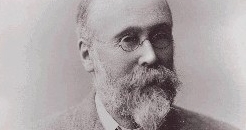 Joseph Rowntree
Joseph Rowntree
Joseph Rowntree (1836–1925), was the son of York grocer Joseph Rowntree (1801-1859) and his wife, Sarah Stephenson (1807–1888). On his father's death in 1859 Rowntree managed the family business with his elder brother, John Stephenson. In 1862 Joseph's younger brother Henry acquired the cocoa and chocolate firm of his former employers and fellow Quakers, the Tukes, and Joseph left the grocery shop to become his partner in 1869. Henry died in 1883, leaving no inheritance and his brother as sole owner.
By 1900 the Rowntree company had become one of Britain's most famous firms, both for its commercial success and in the field of industrial welfare. Rowntree was an influential social reformer as well as a businessman. He realised that old-fashioned paternalism could not work in a very large factory, so he would need to establish formal welfare schemes. A female welfare worker was appointed in 1891; in 1900 a welfare officer was appointed for boys and men. Sick and provident funds were created in 1902; a doctor's surgery was established in 1904; a savings scheme in 1905; a pension scheme in 1906; and a sick benefit scheme in 1910.
Rowntree's most lasting philanthropic act occurred in 1904, when he used half of his wealth to create three (now four) trusts. He declared that he never sought a fortune for himself - and that he did not want his children to the lead the idle lives so often associated with large inheritances.
The Joseph Rowntree Foundation's purpose is to inspire social change. The JRF is an endowed foundation funding a UK-wide research and development programme.
The Joseph Rowntree Reform Trust aims to correct imbalances of political power, strengthening the hands of individuals and organisations striving for reform.
The Joseph Rowntree Charitable Trust is a Quaker trust which seeks to transform the world by supporting people who address the root causes of conflict and injustice.
The Joseph Rowntree Housing Trust's purpose is to inspire and demonstrate social justice. JRHT is a registered housing association and provider of care services managing around 2500.
He built New Earswick, a village in York, for people on low incomes, including staff who worked in his factory, giving them access to decent homes at affordable rents. He was committed to understanding the causes of poverty and disadvantage in order to create a better society. By the time Rowntree died, the model village of New Earswick contained some 400 homes and was served by a range of community and educational facilities.
The trusts still flourish.
Retweet about this article:
Geoff Knott, 26/04/2016